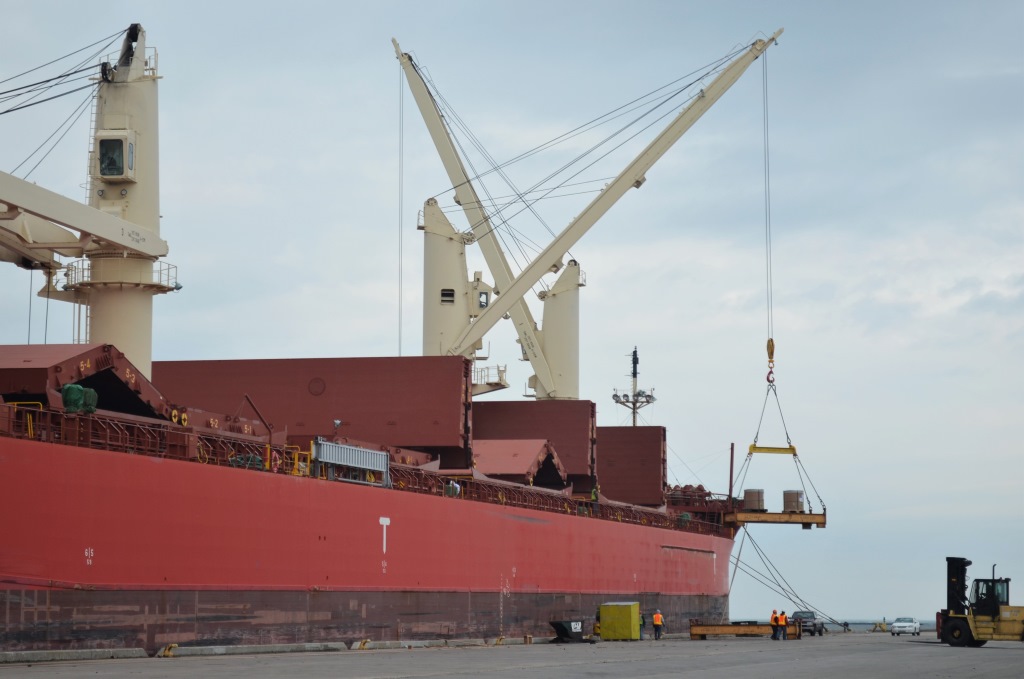Trump Tariffs Hurt Milwaukee Port
Corn exports decimated, steel imports a concern.
The Associated Press is reporting that retaliatory tariffs from China and other countries will affect $27 billion in United States exports, but while some Wisconsin ports are seeing the impacts of tariffs, others aren’t.
President Donald Trump announced tariffs of up to 25 percent on steel and aluminum in March. Those tariffs went into full effect in June. The European Union responded with its own 25 percent tariffs on U.S. products like corn.
Adam Schlicht, Port of Milwaukee director, said now they’re seeing more corn storage.
“We’re already seeing the Canadian corn market respond to the need in Western Europe because under the current tariff regime, customers including some that work at Port Milwaukee, just aren’t exporting corn right now,” said Schlicht.
“I think it’s safe to assume that more of the storage space at harvest will get filled up with the entire harvest of all crops this year,” he said. “CHS’s space availability would be included in that statement.”
Griffith said the tariffs have changed the flow of grain to international markets.
“The Port of Duluth-Superior could ship soybeans to Europe, for example, this harvest season, which would be a very unusual move,” he said. “But that’s because the beans aren’t flowing … to China.”
China placed a retaliatory tariff of 25 percent on U.S. soybean imports in early July. Around 774,000 tons of grain and byproducts moved through the Twin Ports in 2017, which is down from around 1.1 million tons in 2016.
Jason Serck, Superior port and planning director, said earlier this month that port officials are still gauging the impacts of tariffs.
“Sometimes, it takes a while for these to kind of adjust and we may not see that until next year or the year after because these economic swings just don’t happen overnight,” said Serck. “Hopefully, these numbers will go up. I think the latest report just came out that we’re above last year on some of our exports out of here so that’s a good thing.”
Iron ore exports in the Twin Ports, as of July this year, were up slightly over the same time last year, and domestic shipments were higher as well.
But in Milwaukee, Schlicht said he’s worried about steel imports. He said last year was one of the best they’ve had with around 180,000 metric tons of steel imported.
“My anxiety comes in in 2019,” he said. “What will these tariffs and just the proposal of tariffs — even if they’re not fully enacted — mean for existing trade relationships and trade patterns coming into the Great Lakes, including the Port of Milwaukee?”
However, Dean Haen, director of the Port of Green Bay, said they don’t generally handle cargo that’s currently affected by tariffs.
“Current commodities that we’re moving in and out through the port are not impacted by any tariffs that are being placed on foreign goods,” said Haen.
Haen said they handle mostly coal, cement and limestone.
Listen to the WPR report here.
US Ports, Including Some In Wisconsin, Feeling Effects Of Trump Administration Tariffs was originally published by Wisconsin Public Radio.
More about the Trump Tariffs
- Op Ed: Trump Tariffs Have Failed - John Torinus - Sep 27th, 2020
- Murphy’s Law: Trump Tariffs Slam Wisconsin Economy - Bruce Murphy - Jun 29th, 2020
- Baldwin Calling on Trump Administration to Take Action and Support Wisconsin Hardwood Businesses Hurt by Trade War - U.S. Sen. Tammy Baldwin - Feb 25th, 2020
- Trade War Wounds May Heal Soon - Erik Gunn - Feb 21st, 2020
- How China Trade Agreement Impacts Wisconsin Farmers - Miranda Suarez - Jan 16th, 2020
- Trump Tariffs Have Cost State $800 Million - Miranda Suarez - Dec 10th, 2019
- U.S. Senator Tammy Baldwin Seeks Investigation into Possible Market Manipulation Regarding Market Bets Timed to Trump’s Comments on Trade War & Other Geopolitical Events - U.S. Sen. Tammy Baldwin - Oct 21st, 2019
- Port Milwaukee Shipping Up in 2019 - Danielle Kaeding - Oct 21st, 2019
- Stuck to Gallagher: Does Your Party Care About Small Business? - State Rep. Amanda Stuck - Oct 10th, 2019
- Evers Blasts Trump “Tweet” Trade Wars - Erik Gunn - Sep 16th, 2019
Read more about Trump Tariffs here






















